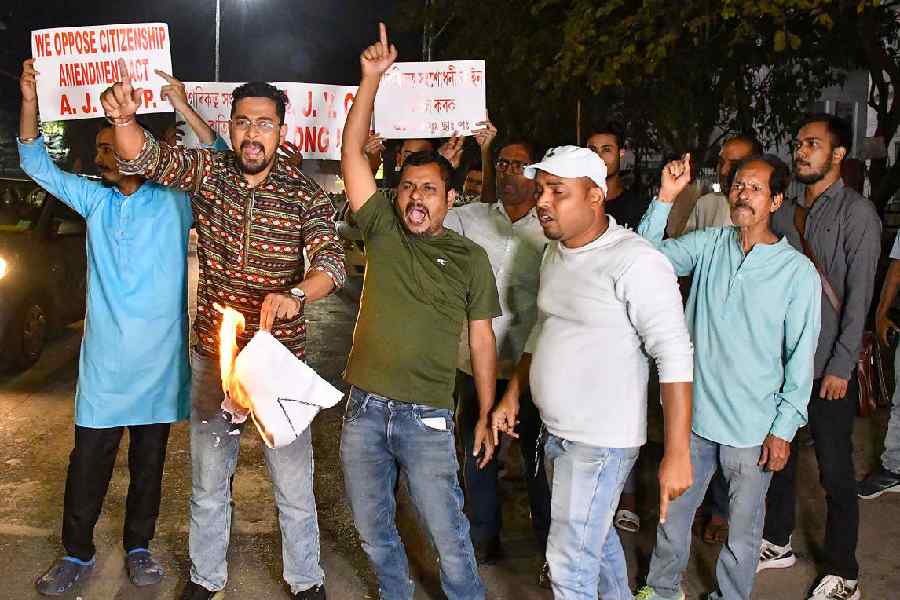The All Assam Students' Union (AASU) and 30 indigenous organisations on Monday burnt copies of the contentious Citizenship (Amendment) Act (CAA) in different parts of the state, including Guwahati, Barpeta, Lakhimpur, Nalbari, Dibrugarh and Tezpur.
The 16-party United Opposition Forum, Assam, (UOFA) announced a statewide hartal on Tuesday, besides taking up other agitational programmes in a phased manner.
"We will continue with our non-violent, peaceful, democratic movement against CAA. Alongside, we will also continue our legal fight", AASU advisor Samujjal Bhattacharjya told PTI.
Bhattacharjya asserted that the indigenous people of Assam and North East will never accept CAA.
"On Tuesday, copies of the CAA will be burnt by the North East Student Organisation (NESO) in all state capitals of the region. AASU and 30 organisations will also take out torchlight processions in Assam, and launch a satyagraha from the next day," he said.
In Dibrugarh, AASU members were engaged in a scuffle with police when the latter tried to stop them from taking out a procession from their office in the Chowkidingi area of the town.
The Nalbari district unit of AASU took out a protest rally and also burnt copies of the Act in front of the local municipal board office.
Pointing out that the Sixth Scheduled areas and states with provisions for Inner Line Permit (ILP) in the North East have been exempted from CAA, Bhattacharjya said, "Our question is, something which is bad for some parts of NE, how can it be good for the other parts. In Assam too, in eight districts it will not be enforced." He also claimed that the CAA goes against the Assam Accord, which sets March 25, 1971, as the deadline for identification of illegal migrants in this northeastern state.
The AASU had been at the forefront in protesting against the CAA since the bill proposing the legislation was brought by the central government, and has already filed a petition in the Supreme Court against the Act.
Meanwhile, students have started protesting against the CAA in different parts of the state, including in front of Cotton University in Guwahati.
The Assam Jatiya Parishad (AJP), which was formed post the anti-CAA movement in the state in 2019-20, staged protests in different parts of the state.
Its members displayed black flags and raised slogans against the government as they took out protest marches in several parts, including Guwahati.
The UOFA has called for a statewide ‘hartal’ on Tuesday, its general secretary and AJP president Lurinjyoti Gogoi told PTI.
"We are going forward with our programme of a hartal tomorrow. We will also take up other protests, including gherao of the state secretariat, as announced earlier", he said.
Opposition political parties, student bodies and other organisations had announced intensifying protests against the CAA when the rules were notified for its implementation.
Chief Minister Himanta Biswa Sarma had asked those opposed to the Act to fight it out at the Supreme Court, maintaining that protests on the streets will bear no fruit as it is already a legislation passed by Parliament.
He had also warned that if political parties call for bandhs, they could lose registration as the Gauhati High Court had passed an order earlier prohibiting bandhs.
With the CAA rules being issued, the Narendra Modi-led central government will start granting Indian nationality to persecuted non-Muslim migrants from Bangladesh, Pakistan and Afghanistan who came to India till December 31, 2014. These include Hindus, Sikhs, Jains, Buddhists, Parsis and Christians.
The CAA was passed in December 2019 but had not come into effect as rules were not notified till now.
Except for the headline, this story has not been edited by The Telegraph Online staff and has been published from a syndicated feed.











